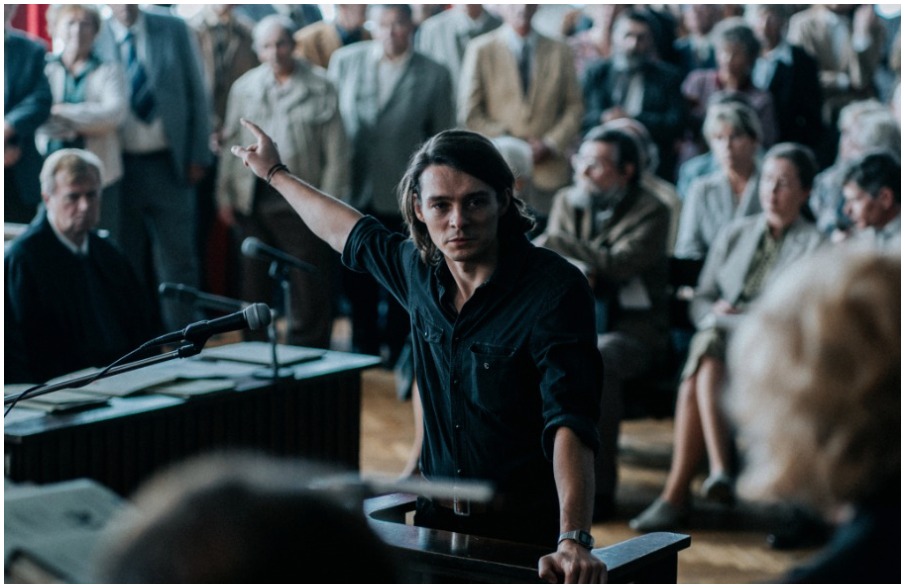“The Palace”, interview with actor Oliver Masucci
"The Palace" by Roman Polanski opens the door to a world of excess, futility and grotesque, to portray with irony the world of the rich and tgeir idiosyncrasies, that have no boundaries.
Listeners:
Top listeners:
 play_arrow
play_arrow
ENGLISH Channel 01 If English is your language, or a language you understand, THIS IS YOUR CHANNEL !
 play_arrow
play_arrow
ITALIAN Channel 02 Se l’italiano è la tua lingua, o una lingua che conosci, QUESTO È IL TUO CANALE!
 play_arrow
play_arrow
EXTRA Channel 03 FRED Film Radio channel used to broadcast press conferences, seminars, workshops, master classes, etc.
 play_arrow
play_arrow
GERMAN Channel 04 Wenn Ihre Sprache Deutsch ist, oder Sie diese Sprache verstehen, dann ist das IHR KANAL !
 play_arrow
play_arrow
POLISH Channel 05
 play_arrow
play_arrow
SPANISH Channel 06 Si tu idioma es el español, o es un idioma que conoces, ¡ESTE ES TU CANAL!
 play_arrow
play_arrow
FRENCH Channel 07 Si votre langue maternelle est le français, ou si vous le comprenez, VOICI VOTRE CHAINE !
 play_arrow
play_arrow
PORTUGUESE Channel 08
 play_arrow
play_arrow
ROMANIAN Channel 09 Dacă vorbiţi sau înţelegeţi limba română, ACESTA ESTE CANALUL DUMNEAVOASTRĂ!
 play_arrow
play_arrow
SLOVENIAN Channel 10
 play_arrow
play_arrow
ENTERTAINMENT Channel 11 FRED Film Radio Channel used to broadcast music and live shows from Film Festivals.
 play_arrow
play_arrow
BULGARIAN Channel 16 Ако българският е вашият роден език, или го разбирате, ТОВА Е ВАШИЯТ КАНАЛ !
 play_arrow
play_arrow
CROATIAN Channel 17 Ako je hrvatski tvoj jezik, ili ga jednostavno razumiješ, OVO JE TVOJ KANAL!
 play_arrow
play_arrow
LATVIAN Channel 18
 play_arrow
play_arrow
DANISH Channel 19
 play_arrow
play_arrow
HUNGARIAN Channel 20
 play_arrow
play_arrow
DUTCH Channel 21
 play_arrow
play_arrow
GREEK Channel 22
 play_arrow
play_arrow
CZECH Channel 23
 play_arrow
play_arrow
LITHUANIAN Channel 24
 play_arrow
play_arrow
SLOVAK Channel 25
 play_arrow
play_arrow
ICELANDIC Channel 26 Ef þú talar, eða skilur íslensku, er ÞETTA RÁSIN ÞÍN !
 play_arrow
play_arrow
INDUSTRY Channel 27 FRED Film Radio channel completely dedicated to industry professionals.
 play_arrow
play_arrow
EDUCATION Channel 28 FRED Film Radio channel completely dedicated to film literacy.
 play_arrow
play_arrow
SARDU Channel 29 Si su sardu est sa limba tua, custu est su canale chi ti deghet!
 play_arrow
play_arrow
“Conversation with” at the 20th Marrakech IFF, interview with actor Willem Dafoe Bénédicte Prot

PODCAST | Matt Micucci interviews Jan P. Matuszyński, director of the film Leave No Traces.
A conversation with Jan P. Matuszyński, director of Leave No Traces, in competition at the 78th Venice Film Festival. The director revisits a dark event in the history of Poland in 1983, where a high school student was brutally beaten by militia. In this interview Matuszyński talks about what prompted him to bring this story to the big screen, the themes of fear and trust, how this story relates to modern times and more.
Leave No Traces: Poland, 1983. The country is shaken by the case of Grzegorz Przemyk—a high school student beaten to death by militia. Based on true events, the film follows the story of Jurek—the only witness of the beating, who overnight became the number one enemy of the state. The oppressive regime used its whole apparatus—the secret service, the militia, the media and the courts—to squeeze Jurek and other people close to the case, including his parents and Przemyk’s mother, Barbara.
Written by: fredfilmradio
Competition Jan P. Matuszyński Leave No Traces Matt Micucci Venezia 78
Film
Festival
Mostra del Cinema di Venezia"The Palace" by Roman Polanski opens the door to a world of excess, futility and grotesque, to portray with irony the world of the rich and tgeir idiosyncrasies, that have no boundaries.
Alice Rohrwacher has been appointed President of the Caméra d’or Jury at Cannes 2025. Known for her poetic and visionary cinema, Rohrwacher will award the best first feature at the festival’s closing ceremony on May 24.
"Silence is death, so don't be silent”m says the actor, one of the guest of 2025 Lovers Film Festival
"We wanted to make a film that put desire as a central force".
“I think America is way behind in terms of putting up queer cinema because everything starts with sex and ends in the sex".





© 2023 Emerald Clear Ltd - all rights reserved.